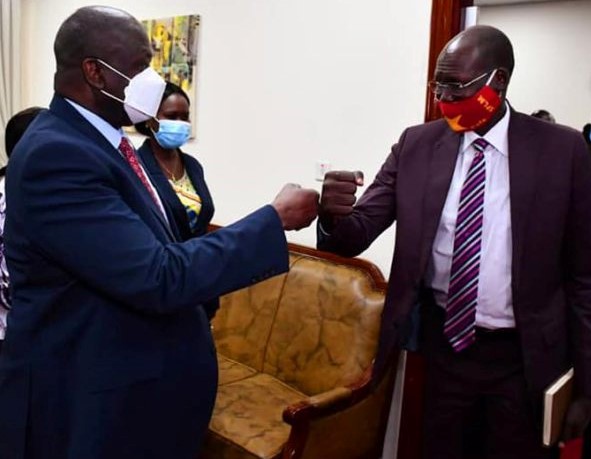SPLM official says Machar caused own defections
March 29, 2022 (JUBA) – The interim Secretary General of South Sudan’s ruling party (SPLM), Peter Lam Both has said the defections in the armed opposition faction (SPLM/A-IO) meant its leader was no longer in control.
First Vice President Riek Machar leads the armed opposition movement.
“The reality is that Dr. Machar and his supporters know that he is not in full control of his forces. It is not that they are paid to defect. No one can purchase the whole movement even if funds are available”, said Lam.
He added, “We have been saying that the war in South Sudan is a war for power-sharing. If some leaders don’t see themselves in their party as getting lucrative political positions, they defect and join another group in protest to the decision of their party leader. Dr. Riek Machar of all people knows this more than anyone and we had hoped that he would not blame the disintegration of his party on other people or political parties”.
The SPLM official, while reacting to the Troika’s concerns on the peace deal implementation, said Machar’s decision to leave out some members of his own faction, caused them to defect and crossed to the government where they hoped would get employment to sustain their political ambitions.
He specifically cited defections from the Juba government to other political organisations, including the Machar-led armed opposition faction.
“There are leaders from SPLM who defected and joined SPLM/A-IO for the possibility of greener pastures on the other side. The same is true for leaders from SPLM/A-IO and their supporters who defected and joined the SPLM. In 2015, for example, the majority of generals who fought the war in 2013-2014 on the side of SPLM/A-IO defected and either established independent movements some of which are now in SSOA, or joined the Government. Who incentivized their defection in 2015?” asked Lam.
The senior ruling party official blamed the First Vice President for the defections of armed opposition generals who formed Kitgwang faction.
The Kitgwang Declaration was a coup by the former SPLA-IO former chief of staff, Gen. Simon Gatwech Dual on August 4, 2021, in which he replaced Machar as leader of the armed opposition group sparking deadly clashes.
“After the signature of the R-ARCSS and formation of the Revitalized Government of National Unity, mass defections from SPLM/A-IO were witnessed as a protest to the decisions of their leadership for failing to appoint them in the government positions they wanted,” stressed Lam.
Analysts, however, argue that the row is not about a lack of political will to implement the peace deal or stalemates over key issues that require dialogue for implementation, but rather an exhibition of a power struggle to continue to claim and assert political relevance in the country’s affairs.
The legitimacy of the current expires in 2023 and the government and the opposition suffer irrelevance without the peace agreement or elections.
But while opposition supporters accuse the ruling party of using dirty tricks, the genuine divisions in the opposition have undoubtedly hindered its ultimate goal of removing the ruling party faction under President Salva Kiir.
Meanwhile, the speaker of the transitional national legislative assembly, Jemma Nunu Kumba, said it was high time parties to the 2018 agreement commit themselves to peaceful dialogue to resolve issues requiring discussions in order to move the country forward.
“This blame game is not helping. There is an incentive to forging collaborative working relations. The agreement needs to be implemented in the spirit of consensus and compromise. Unfortunately, what is happening is the finger pointing to delay the process”, she explained.
According to the former SPLM Secretary General, lack of opportunities in parties have largely contributed to defections from one entity to another.
“We have colleagues who have defected from us and joined other parties and we did not blame them because defections are individual choices and decisions to make. But it happened in other parties, they tried to find faults in others. This is wrong and people should know that there are defections for political reasons. They are always plotting against each other, but they always want to blame the SPLM and the president, said Kumba.
She further stressed, “We have nothing to do with their troubles. That is their own affairs. They should not find fault in others”.
The SPLM was initially founded as the political wing of the Sudan People’s Liberation Army (SPLA). The party, in the aftermath of the civil war that broke out in the country in mid-December 2013, split into the SPLM-Juba faction headed by Kiir, SPLM-IO led by Machar and that of the country’s former political detainees.
In January 2015, delegates from three factions of the SPLM party signed a 12-page agreement in Arusha, Tanzania, laying out key steps toward reunifying the party. Those who signed include the party loyal to President Kiir, the SPLM/A-IO led by Machar, and members of the former political detainees.
(ST)

